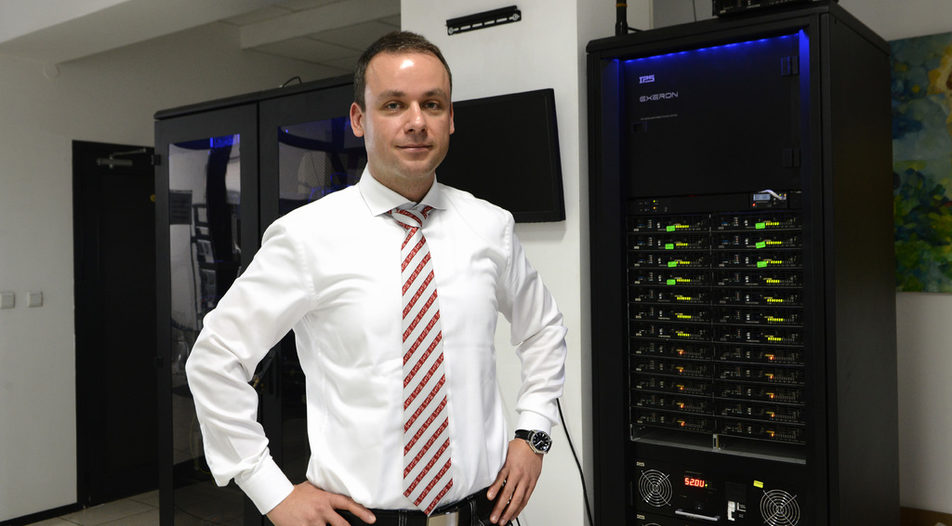A Bulgarian company with a profitable business in energy management and smart grids received a capital boost from the Bulgarian Development Bank (BDB).
The Capital Investment Fund of the state-owned bank invested 6.5 million levs (3.3 million euro) in the Bulgarian tech company International Power Supply (IPS). The financing is in the form of a capital increase, and the fund will acquire a 3% stake in the firm.
The transaction puts IPS' value at 216.7 million levs. The funds will be used for research and development and will enable the firm to expand even more in its current markets - Saudi Arabia and the United States.
Smart grids
IPS is a Bulgarian family business with virtually no projects in Bulgaria but one that is widely known in nearly 60 other countries. Its main product, the Exeron system, provides an independent power supply for remote sites, using renewable sources of energy (RES). The company's focus is now on smart grids that provide decentralized electricity supply in regions with developed infrastructure.
The company already has a US patent for the entire architecture of a smart grid that combines renewables, Exeron, and batteries. "In this way, electric cars and new sources of renewable energy can be integrated into existing networks, and energy can be distributed to different types of consumers in an intelligent way," CEO Alexander Rangelov told Capital Weekly.
From Saudi Arabia to Hawaii
The main part of the BDB's investment will go to the development of facilities in Saudi Arabia and the United States where the company already has operations. "We need to have local structures there to expand the scope of the business - people, offices, follow-up services," Rangelov said. According to him, the involvement of a state fund in the company is very important as it is perceived as a guarantee and generates trust in foreign clients and partners.
IPS entered Saudi Arabia's market five years ago, and signed a strategic partnership agreement with the kingdom's Public Investment Fund in 2020 giving it access to key projects in exchange for knowledge and technology transfer. "The investment comes at the right time because we recently registered a subsidiary in Saudi Arabia and will be able to start hiring people," Rangelov said.
In the United States, the company is already on its third contract in the state of Hawaii where it works with a local distributor. Hawaii is a very suitable spot for IPS technology as, according to Rangelov, electricity is expensive and there are frequent power outages. The company is now planning an expansion to California and nearby states, where it will form local teams.
The company's expansion in recent years has allowed IPS to grow rapidly. In 2020, the company's turnover increased by about two-thirds, reaching 16.5 million levs.
Stepping into Saudi Arabia
In 2019, IPS finished a project to supply power to three natural gas wells of Saudi Aramco, which is the first such technological application in the world. The successful completion of the project opened many opportunities for IPS.
Alexander Rangelov says he targeted Saudi Arabia as a personal challenge. On the one hand, the market there is specific and difficult to access. On the other, the client is the world's largest oil and gas company. IPS first tried to get in contact with Saudi Aramco eight years ago but without success. "That is a huge structure with 80,000 people and reaching someone who will notice you is very hard," Rangelov says.
This changed in 2014 when IPS's Exeron won the world ees AWARD (electrical energy storage prize) in Germany for the best system for autonomous power supply and storage. Exeron is an all-in-one modular power conversion system developed to withstand the harshest conditions - air temperatures from minus 40 to over 80 degrees Celsius, and high levels of dust, sand and humidity. It was developed and designed mainly for off-grid supply of electricity to single or multiple sites (Mini Grid) in remote or rural areas but also massive OPEX reduction and diesel generator replacement, IPS says.
The company was then invited to present its technology at Saudi Aramco's headquarters but, as Rangelov says, "for them, we were just another best company". The Arab giant had already made many unsuccessful tests and considered RES-based power supply systems to be unreliable. The team also had to tackle additional problems like the overheating of electronics, damage to batteries from the heat, and preventing the access of thieves. Rangelov convinced them IPS can solve all those issues, and in the end succeeded, opening the door to other projects in the kingdom.
A Bulgarian company with a profitable business in energy management and smart grids received a capital boost from the Bulgarian Development Bank (BDB).
The Capital Investment Fund of the state-owned bank invested 6.5 million levs (3.3 million euro) in the Bulgarian tech company International Power Supply (IPS). The financing is in the form of a capital increase, and the fund will acquire a 3% stake in the firm.












